A Clever Canine: Unraveling the Enigmatic Basenji!
Introduction and Breed Background
Welcome, dear readers, to the captivating world of the Basenji Dog, where ancient history meets modern charm! With a name that rolls off the tongue and a personality that sparkles like stardust, the Basenji is sure to bewitch you. Nicknamed "The Barkless Dog," these canny companions have some unique tricks up their paws. Before we dive into this mesmerizing breed's enchanting traits, let's embark on a journey through their rich history and learn what makes them a one-of-a-kind canine wonder!
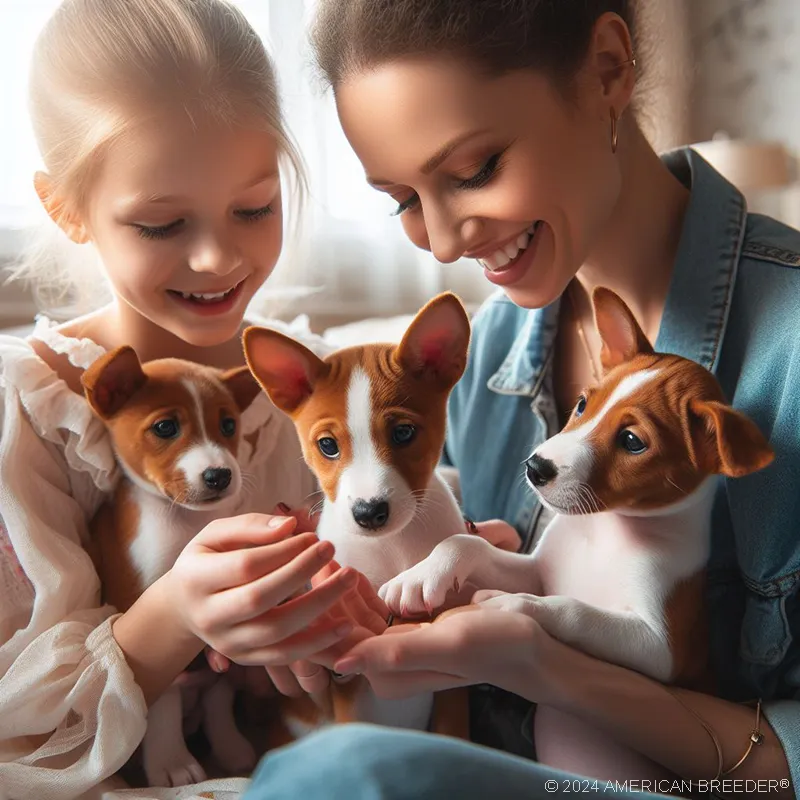 Considerations to understand before choosing this breed:
Considerations to understand before choosing this breed:
Before you fall head over paws for the Basenji, there are some essential considerations to keep in mind. This breed's intelligence and independence might be endearing, but they also come with a touch of mischief. Basenjis love to explore and can be escape artists, so a secure backyard and proper supervision during outdoor adventures are a must. Their hunting instincts are as keen as ever, so it's essential to provide them with ample mental and physical stimulation to prevent boredom-induced shenanigans. Finally, their vocalization abilities may be different from what you're used to in other breeds, so get ready to communicate with your Basenji in a whole new way!
Interesting facts and fun facts about this breed:
Did you know that the Basenji is one of the most ancient dog breeds, dating back thousands of years? Their lineage can be traced to Africa, where they were esteemed as loyal hunting companions and esteemed members of the local tribes. Their distinctive vocalization, often described as a yodel or a sound similar to a "barroo," sets them apart from other breeds, and they are among the few dogs that do not bark like their canine counterparts. Additionally, their grooming habits resemble those of cats, as they meticulously clean themselves like little feline furballs. This breed's resourcefulness has earned them the nickname "African Barkless Dog" and, on occasion, the "Shiny Dog" due to their short, sleek coats that glisten like polished gemstones. Now, let's travel back in time to uncover the intriguing origins of the Basenji!
Breed Background and History
In the heart of Africa, in the distant past, the Basenji Dog first made its mark on history. These clever canines were treasured companions to the ancient Egyptians, serving as hunting allies and household pets for Pharaohs and nobles alike. With their keen sense of smell and remarkable agility, they were adept at tracking small game through dense jungles and open savannahs. Their role as trusted protectors and skilled hunters earned them a special place in the hearts of their human counterparts.
 As the centuries rolled on, the Basenji's reputation as a remarkable and mysterious breed spread beyond the borders of Africa. Traders and explorers introduced them to various parts of the world, where they continued to charm and fascinate all who encountered them. Fast forward to the 19th century, when European travelers brought some of these captivating canines back to their homelands. Their arrival in the Western world ignited curiosity and interest, leading to the establishment of breed standards and the formal recognition of the Basenji by prominent kennel clubs.
As the centuries rolled on, the Basenji's reputation as a remarkable and mysterious breed spread beyond the borders of Africa. Traders and explorers introduced them to various parts of the world, where they continued to charm and fascinate all who encountered them. Fast forward to the 19th century, when European travelers brought some of these captivating canines back to their homelands. Their arrival in the Western world ignited curiosity and interest, leading to the establishment of breed standards and the formal recognition of the Basenji by prominent kennel clubs.
Historical significance or cultural relevance:
Throughout the annals of history, the Basenji has made its mark on various cultures and societies. In ancient Egypt, these agile hounds were held in high regard, often depicted in paintings and sculptures alongside Pharaohs, symbolizing their elevated status. Their hunting prowess was celebrated, and they were even buried with their human companions, an indication of the deep bond they shared with their owners.
As they journeyed beyond the deserts of Africa, the Basenji's captivating traits and endearing character captured the hearts of people across the globe. From Europe to North America and beyond, these charming canines became treasured family members and beloved show dogs, showcasing their versatility and intelligence in various settings.
Purpose or original use of the breed:
From the ancient plains of Africa to the present-day living rooms, the Basenji's purpose has evolved, but its core traits have remained steadfast. Originally bred as skilled hunters, their agility, speed, and sharp senses made them invaluable in tracking and catching small game. Their keen observation skills and independent nature allowed them to make quick decisions in the pursuit of their quarry.
In modern times, while the Basenji's hunting duties have lessened, their intelligence and agility have found new outlets. They excel in canine sports like lure coursing, where they chase an artificial lure with incredible zest and excitement. Additionally, their charming demeanor and distinctive yodel-like vocalizations have made them popular as show dogs and beloved family pets around the world.
Please provide a short sentence specifying the kennel clubs that classify, group, or register this breed dog:
The Basenji is proudly recognized by esteemed kennel clubs worldwide, including the American Kennel Club (AKC), The Kennel Club (UK), Fédération Cynologique Internationale (FCI), and others, where they are classified as a member of the hound group due to their exceptional hunting instincts and abilities.
Appearance
Size, weight, activity level, and physical appearance:
The Basenji is a medium-sized breed, with males typically standing around 17 inches tall at the shoulder, while females are slightly smaller at approximately 16 inches. In terms of weight, males generally range from 24 to 26 pounds, and females are slightly lighter, weighing in at 22 to 24 pounds. This compact size makes them ideal for various living arrangements, including apartments and houses with limited space.
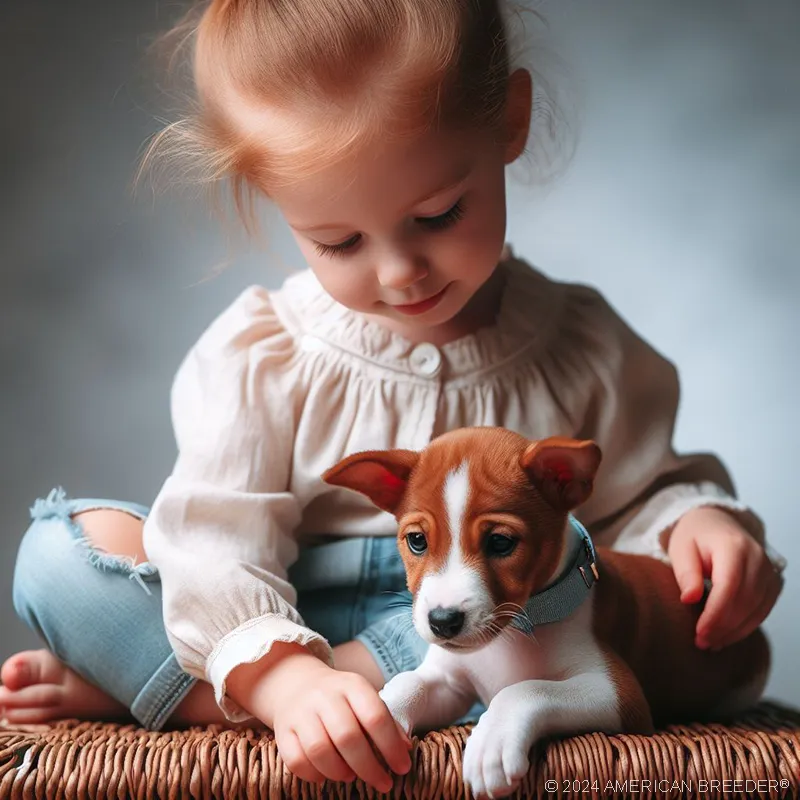 As for their activity level, the Basenji is no couch potato! Their hunting heritage ensures that they are agile and energetic, always ready for an adventure. Regular exercise is essential to keep them happy and prevent them from channeling their energy into less desirable activities. Daily walks, playtime, and interactive toys are a must to keep these intelligent canines entertained and content.
As for their activity level, the Basenji is no couch potato! Their hunting heritage ensures that they are agile and energetic, always ready for an adventure. Regular exercise is essential to keep them happy and prevent them from channeling their energy into less desirable activities. Daily walks, playtime, and interactive toys are a must to keep these intelligent canines entertained and content.
Coat type, color variations, and patterns:
The Basenji sports a short, sleek coat that requires minimal grooming. Their fur lies close to their body, offering a glossy sheen that enhances their regal appearance. This low-maintenance coat is a blessing for busy pet parents who prefer to spend more time playing fetch than brushing!
Basenjis come in various beautiful color variations, adding to their allure. You can find them in rich chestnut red, black, tricolor (black, tan, and white), and brindle (striped) patterns. These unique coat colors and patterns make every Basenji a one-of-a-kind work of art, capturing the attention of dog lovers and admirers alike.
Distinctive features or markings:
One of the Basenji's most distinctive features is their tightly curled tail, which rests gracefully over their back, almost like a crown of fluffy delight. It's a tail fit for a king—or queen—worthy of their dignified and playful nature.
The Basenji's almond-shaped eyes are alert and expressive, with a keen intelligence that seems to penetrate your very soul. As they gaze into your eyes, you can't help but feel an unbreakable bond forming between you and your canine companion.
Average litter size for this breed:
When the Basenji family grows, it's a moment of pure joy! On average, their delightful litters consist of four to six adorable puppies. These little bundles of joy inherit the Basenji's keen intelligence and playful spirit, making them a joy to raise and train. Watching them grow and explore the world around them is a heartwarming experience that will fill your home with boundless love and laughter.
Temperament and Personality
As we delve deeper into the Basenji's enchanting world, we uncover their mesmerizing temperament and delightful personality. These clever canines are independent thinkers, and their history as hunters has instilled them with a sense of self-reliance. While they form strong bonds with their human family, they also possess a touch of aloofness with strangers, observing new faces with a discerning eye.
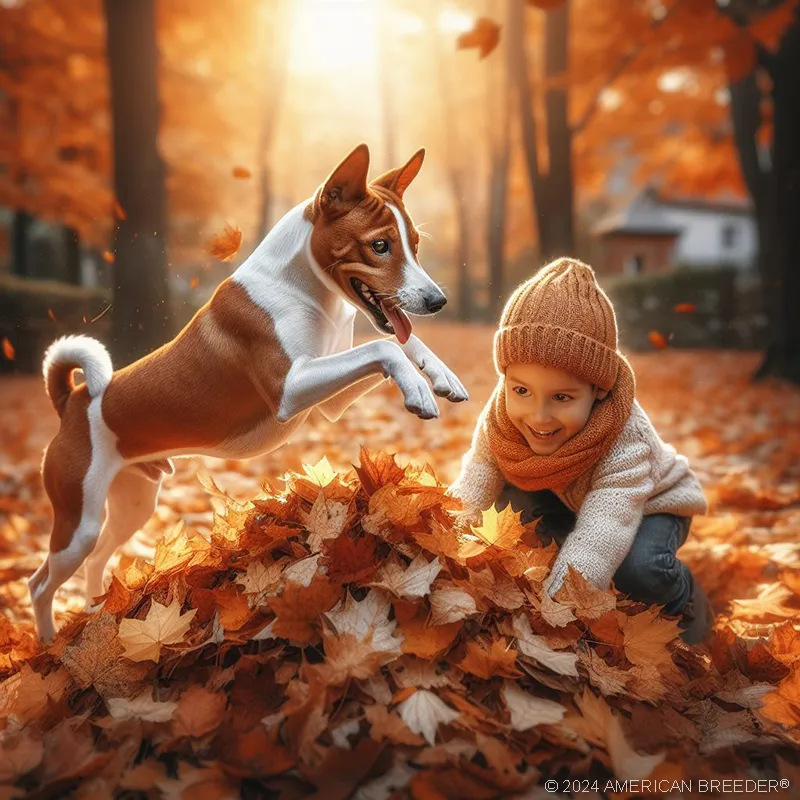 Energy levels and activity requirements:
Energy levels and activity requirements:
The Basenji's energy levels are akin to a starburst of enthusiasm! Their hunting heritage bestows them with remarkable agility and stamina, and they thrive on regular physical and mental stimulation. Engaging in daily walks, play sessions, and interactive toys will keep these bright minds and boundless energy fully engaged, preventing boredom and potentially destructive behaviors.
Compatibility with different lifestyles and family dynamics:
The versatile Basenji is a breed that can adapt to various lifestyles and family dynamics. They are well-suited for active individuals or families who enjoy outdoor adventures and are willing to engage in fun activities with their four-legged friend. However, it's essential to ensure that your Basenji gets ample exercise and mental stimulation, as they may become restless if left without activities to occupy their sharp minds.
List of Typical Behavior Issues:
Like all breeds, Basenjis may exhibit certain behavior issues if not appropriately addressed and trained. Understanding these potential challenges can help you better prepare for a harmonious life with your canine companion:
Aggression and Biting: Proper socialization and training from an early age can help mitigate aggressive tendencies and discourage biting behavior.
Excessive Barking: While Basenjis are known for being "barkless," they are not entirely silent and may vocalize when excited or stressed. Training to control their vocalizations can be beneficial.
Digging: Some Basenjis have a penchant for digging, a trait reminiscent of their hunting days. Providing designated digging areas and engaging activities can redirect this behavior.
Separation Anxiety: Their strong bond with their family can lead to separation anxiety when left alone for extended periods. Gradual training to help them feel comfortable when alone is essential.
Resource Guarding: Basenjis can be possessive of their toys or food. Teaching them to share and trade can help prevent resource guarding behavior.
Fear and Phobias: Basenjis may be sensitive to certain stimuli, such as loud noises or unfamiliar environments. Positive reinforcement training can build their confidence and alleviate fears.
Trainability and Intelligence
The Basenji's intelligence shines like a guiding star in the night sky, and with the right approach, their trainability is a joy to behold. While they possess an independent streak, their eagerness to please their humans makes them highly receptive to positive reinforcement training.
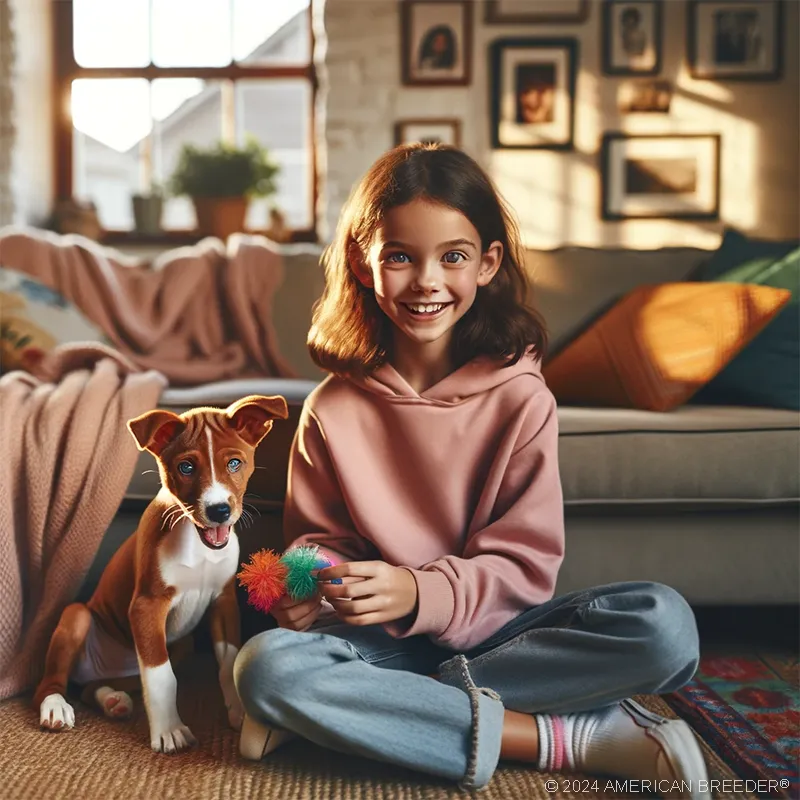 Willingness to please their owner:
Willingness to please their owner:
Basenjis are incredibly eager to please their owners, and their love for praise and rewards makes training a delightful experience for both parties. Utilizing treats, toys, and verbal praise will reinforce desired behaviors, creating a strong bond between you and your furry friend.
Intelligence and problem-solving abilities:
Prepare to be amazed by the Basenji's problem-solving prowess! Their keen intelligence allows them to assess situations and make quick decisions. Engaging their minds through interactive toys, puzzle games, and scent work challenges keeps them mentally stimulated and happy.
Recommended training approaches and techniques:
When training a Basenji, opt for positive reinforcement methods, which reward good behavior rather than punishing undesirable actions. These clever canines respond well to rewards and encouragement, fostering a cooperative and enjoyable training environment. Socialization from a young age is also crucial to help them feel confident and at ease in various situations.
Best-suited training or skill type:
Basenjis excel in a wide range of activities, and the best-suited training for them depends on their individual interests and your preferences. Their agility, speed, and intelligence make them ideal candidates for agility training, where they can navigate obstacle courses with grace and precision. Scent work and tracking exercises tap into their excellent sense of smell, allowing them to follow their instincts and uncover hidden treasures. These activities not only fulfill their innate needs but also strengthen the bond between you and your Basenji, creating a magical partnership that will brighten your days.
Practical Considerations
Size of sleeping quarters depending on size:
While the Basenji's size makes them suitable for a variety of living arrangements, ensuring they have a comfortable sleeping area is essential. Consider providing a cozy and safe space for your Basenji to retreat to, such as a dog bed or a crate with soft bedding.
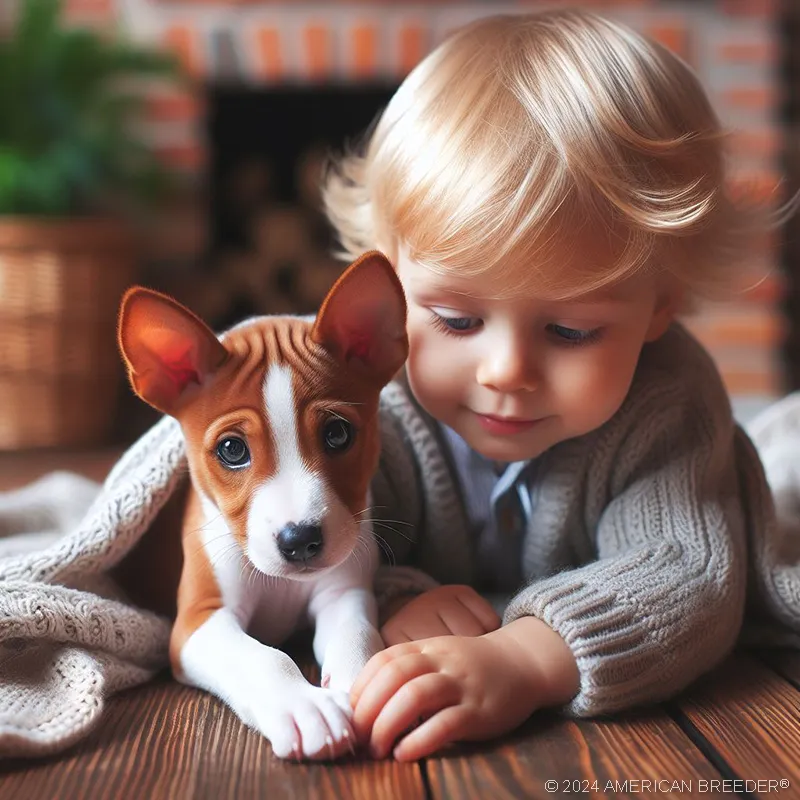 Typical annual veterinary cost:
Typical annual veterinary cost:
Ensuring the well-being of your Basenji requires regular veterinary check-ups, vaccinations, and preventive care. The average annual veterinary cost for a Basenji can vary depending on your location and the specific services required. On average, pet parents should budget for around $500 to $1,000 for routine veterinary care, excluding any unforeseen medical expenses.
Type of grooming and annual cost:
One of the perks of having a Basenji is their low-maintenance coat. Their short, sleek fur requires minimal grooming, such as occasional brushing to remove loose hair and regular dental care. The annual cost for grooming is relatively low, around $50 to $100 for basic grooming supplies and dental care.
Energy level and exercise needs:
The Basenji's energy level is comparable to a shining star, and they require ample physical and mental exercise to stay happy and healthy. Daily exercise, such as brisk walks, playtime, and interactive activities, is essential to keep them mentally stimulated and prevent boredom-related behaviors.
Daily exercise needs and requirements:
To keep your Basenji's spirit shining brightly, aim for at least 60 to 90 minutes of daily exercise. Engaging in fun activities like playtime, fetch, and interactive games will not only keep them physically fit but also strengthen your bond and brighten your days together.
Level of playfulness:
When it comes to playfulness, Basenjis twinkle like the stars in the night sky. Their exuberance and curiosity make playtime a cherished affair. Fetching balls, chasing toys, and solving puzzle games are just some of the ways you can indulge in playtime with your clever companion.
Level of intelligence:
The Basenji's intelligence glimmers like the Northern Lights, captivating anyone lucky enough to witness it. Their problem-solving abilities and quick wit make them adept at learning new tricks and commands, proving that they are not only good-looking but also incredibly clever!
Affection level and desired attention:
Basenjis adore their families and have a heart as vast as the galaxy. They crave affection and enjoy spending time with their loved ones. However, their independent nature means they may also appreciate having some alone time to recharge their celestial batteries.
Friendliness toward strangers:
Like a constellation of stars, Basenjis possess a certain aloofness toward strangers. While they are not aggressive, they may be reserved when meeting new people. Early socialization is essential to help them feel more at ease in unfamiliar situations.
Health and Care
Common health issues or predispositions of the breed:
While Basenjis are generally a healthy breed, they are prone to certain health issues that responsible pet parents should be aware of. One of the primary health concerns in Basenjis is Fanconi syndrome, a genetic kidney disorder that affects their ability to reabsorb essential nutrients in the body. Regular veterinary check-ups and routine blood and urine tests can help detect any potential health issues early on, allowing for prompt treatment and management.
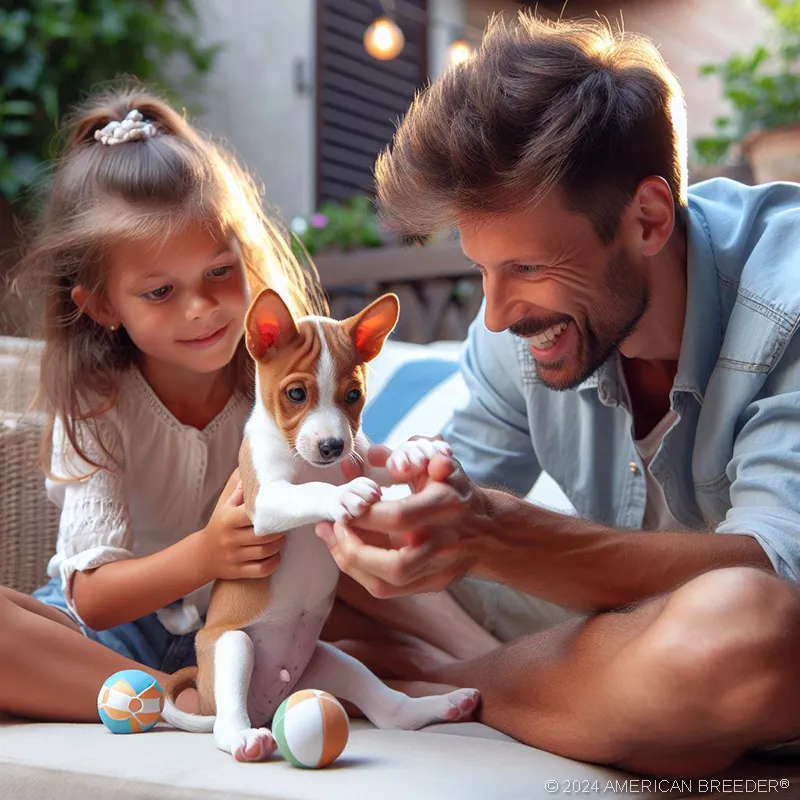 Allergies and specific dietary considerations:
Allergies and specific dietary considerations:
Basenjis can be sensitive to certain food ingredients, leading to allergies and digestive issues. To ensure their optimal health, choose a high-quality dog food that suits their individual needs. Some Basenjis may thrive on grain-free or limited-ingredient diets, while others may benefit from foods formulated for sensitive stomachs. Consulting with your veterinarian and monitoring your Basenji's reactions to different foods will help identify the best dietary plan for them.
Lifespan and longevity expectations:
The celestial journey of a Basenji is meant to last for many years, as they typically enjoy a lifespan of 12 to 16 years. With proper care, regular exercise, and a balanced diet, these clever canines can shine brightly in your life for a long time, providing you with endless love and cherished memories.
Grooming requirements based on coat type and size:
Grooming the Basenji is a breeze, much like a gentle breeze on a starry night. Their short, sleek coat requires minimal grooming, usually limited to a weekly brushing to remove loose hairs and keep their coat looking its best. Regular dental care, such as brushing their teeth and providing dental chews, will maintain their sparkling smiles and ensure optimal oral health.
Exercise needs and recommendations for physical and mental stimulation:
To keep your Basenji's celestial spirit shining brightly, they require both physical and mental exercise. Engaging in daily walks, playtime, and interactive games will satisfy their need for activity and mental stimulation. Adding variety to their exercise routine, such as agility training or scent work, will further enrich their lives and keep their minds sharp and focused.
Nutrition and feeding guidelines:
Providing your Basenji with a well-balanced and nutritious diet is essential to support their overall health and well-being. Choose a dog food that is appropriate for their age, size, and activity level, and ensure they have access to fresh water at all times. Feeding guidelines can vary depending on their individual needs, so consulting with your veterinarian will help determine the right portion sizes for your clever companion.
Socialization and Compatibility
 Interaction with children, other pets, and strangers:
Interaction with children, other pets, and strangers:
The Basenji's starlit heart extends to all members of the family, including children and other pets. They can form strong bonds with children and are often gentle and playful with them. However, like any dog, supervision and proper introductions are crucial to ensure safe and harmonious interactions.
With strangers, Basenjis may be reserved or aloof, but early socialization can help them become more comfortable in new situations. Positive experiences and exposure to different people will foster their confidence and make them more open to meeting new faces.
Socialization needs and tips for proper socialization:
From a young age, exposing your Basenji to various sights, sounds, and experiences will help them become well-adjusted and confident dogs. Socialization should be a positive and rewarding experience, introducing them to new places, people, and other animals in a safe and controlled manner.
Precautions or considerations for multi-dog households:
When bringing a Basenji into a multi-dog household, gradual and supervised introductions are essential. Their independent nature means they may not always get along with other dominant or assertive dogs. Ensuring a harmonious pack dynamic through positive reinforcement training and plenty of socialization will promote a peaceful and joyful home for all your four-legged companions.
Living Arrangements and Environment
Suitability for different living arrangements (apartment, house, rural area):
The Basenji's adaptability allows them to shine brightly in various living arrangements. Whether you reside in a cozy apartment, a suburban house, or a rural area, these versatile canines will thrive as long as they receive the proper care and exercise they need.
Space requirements and exercise options for the breed:
While Basenjis are relatively compact in size, their celestial energy requires ample space for exercise and play. Living in an apartment or a house without a yard is entirely possible, as long as you provide daily outdoor walks and opportunities for off-leash play in dog parks or other secure areas.
Climate considerations and adaptability:
Basenjis can handle moderate temperatures comfortably, but extreme cold or heat may require extra precautions. In colder weather, provide them with cozy blankets and indoor play options to keep them warm. During hot weather, ensure they have access to shade, plenty of water, and limit their outdoor activities to cooler parts of the day to prevent overheating.
How big of a yard should a person have with this type of dog?
A moderate-sized yard is ideal for a Basenji, where they can stretch their celestial legs and indulge in playtime. A securely fenced yard will allow them to enjoy outdoor time safely, and additional mental stimulation, such as hide-and-seek games or treat-dispensing toys, will make their time in the yard even more enjoyable.
Training and Obedience
Basic obedience training and commands:
Training a Basenji in basic obedience is a journey that will take you to the stars and back. These intelligent canines quickly pick up on commands and thrive on positive reinforcement. Teaching them basic commands like sit, stay, come, and leash walking is essential for their safety and well-being.
Advanced training or specialized activities suited for the breed:
Once the basics are mastered, the sky's the limit when it comes to advanced training for Basenjis. Their agility and problem-solving abilities make them excellent candidates for advanced obedience training, agility courses, and even scent work challenges. Engaging in such activities will not only stimulate their minds but also strengthen the bond between you and your stellar companion.
Behavioral challenges or specific training considerations:
As with any breed, Basenjis may have unique behavioral challenges that require thoughtful training and management. For example, their independent nature may lead to selective listening or a penchant for exploring on their own terms. Consistency, patience, and positive reinforcement training will help address any behavioral challenges and foster a strong and trusting relationship with your clever canine.
Conclusion
Congratulations, dear readers, for embarking on this celestial journey through the captivating world of the Basenji Dog! Their intelligence, independence, and enchanting personality make them a breed like no other, perfect for those seeking a spirited and devoted companion. Remember, responsible ownership, consistent training, and plenty of love and care are the keys to fostering a lifelong bond with your Basenji. Embrace the adventure, and together, you and your clever companion will shine as brightly as the stars in the night sky!
Basenji Dog Quick Reference Guide
Breed Background: Origin: Central Africa | Breed Purpose: Hunting small game | AKC Class: Hound Group | Year Recognized by AKC: 1943
 Appearance: Size: Small to Medium | Weight: 22-24 pounds | Coat Type: Short and fine | Colors & Patterns: Red, black, tricolor, brindle; white on chest, feet, and tail tip | Distinctive Features: Wrinkled forehead, tightly curled tail
Appearance: Size: Small to Medium | Weight: 22-24 pounds | Coat Type: Short and fine | Colors & Patterns: Red, black, tricolor, brindle; white on chest, feet, and tail tip | Distinctive Features: Wrinkled forehead, tightly curled tail
Temperament: Energy Level: 4 | Friendliness to Pets: 3 | Friendliness to Strangers: 2 | Trainability: 3 | Playfulness: 4 | Frequent Barker: 2 | Chase Instincts: 5 | Sense of Smell: 4 | Drive to Hunt: 5
Health & Care: Health Issues: Fanconi syndrome, hip dysplasia | Lifespan: 12-14 years | Grooming Difficulty: Low | Exercise Needs: High
Socialization: Interaction with Children: Supervised play recommended | Interaction with Pets: Can be aloof; early socialization important | Interaction with Strangers: Reserved | Ease of Training: Moderate
Suitable Living Arrangements: Apartment: Not ideal, needs regular exercise | House: Preferable with a yard | Rural Area: Yes | Yard Size Requirements: Medium to large yard recommended
Training & Obedience: Trainability: 3 (Moderate) | Intelligence: 4 (High) | Obedience: 2 (Low) | Problem-Solving: 3 (Limited) | Easily Stimulated: 4 (High) | Focus Level: 3 (Moderate) | Easily Distracted: 4 (High)
Financial Planning: Typical Price Range: $800 - $2,000 | Initial Expenses: Puppy vaccinations, crate, toys | Ongoing Annual Expenses: Food, grooming, medical check-ups
Breeding: Reproductive Maturity: 6-12 months | Litter Frequency: Once a year | Litter Size: 4-6 puppies | Stud Cost: Varies based on pedigree | Breeding Challenges: Estrus can be irregular
Did You Enjoy this Article? Share it and Help Us Spread the Word!
If you found this article helpful, we'd appreciate it if you could share it with your friends or link to it from your website, blog, or group! You can also use the convenient social share tabs on the left side of the screen to instantly share this page to your social media feed. For more ways to support and promote the American Breeder Community, visit our Share & Promote Together page for social media posts and memes you can copy and share. Your support means the world to us!
Disclaimer: The information provided in this article is for general informational purposes only and does not constitute legal, medical, financial, or professional advice. While we strive for accuracy, we make no representations or warranties regarding the completeness, accuracy, reliability, or suitability of the information. Please consult with a professional before making decisions based on the content provided. American Breeder Inc. assumes no responsibility for any errors or omissions or for the results obtained from the use of this information.
